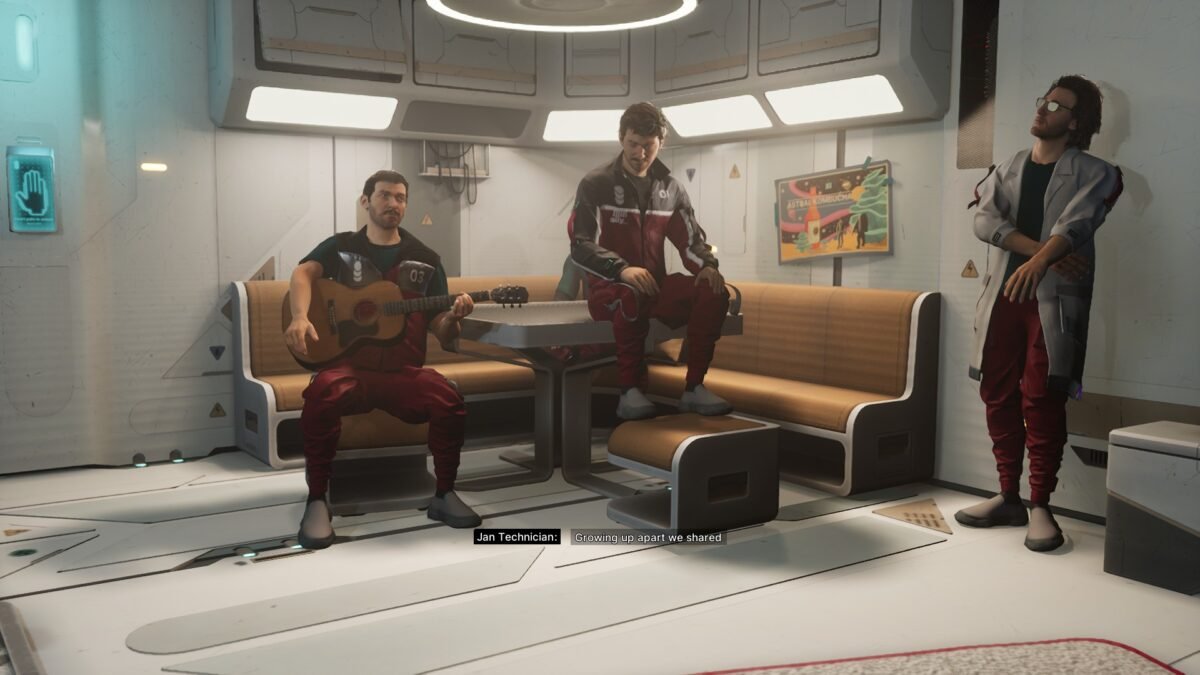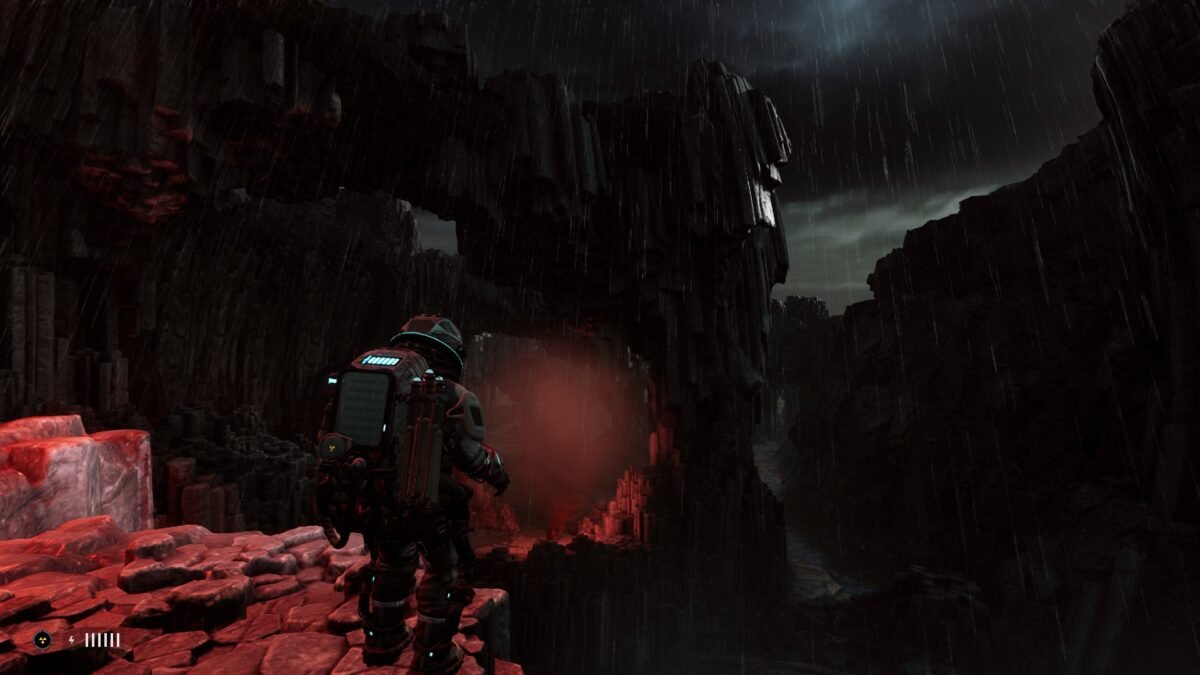The Alters bridges base building with consequential storytelling to craft an experience that will stick with you, long after you have moved on from the game. 11 Bit Studios has crafted a beautiful world that leaves you with awe many times and fills you with despair, as the game progresses to rougher areas. Every aspect of the game flows well, with its immersive narrative, engaging gameplay, and base crafting, all of which act like knots on a string, pulling the game to new heights. This is our review of The Alters
Abandoned Ship, Abandoned World, Abandoned Life

One of the notable aspects of The Alters is the sense of dread that kicks in the second the prologue kicks off, as I find myself on an unknown planet with a roaring ocean on the side, with dark grey clouds hovering over my head. That sense of isolation hit my head like a double-barreled shotgun.
11 Bit Studios have always successfully created that feeling of helplessness in their games, and that lonesome vibe is also present in The Alters as well. Nearly every area in the game has its own hazardous environment, with your ship being the only vessel containing life that moves from one isolated spot to another. The audio also does a good job of elevating the visual scenery present on the screen. Overall, the team did an excellent job creating the lost-in-space feeling through worldbuilding.
Every notable spot has a sign that distinguishes it from the others. This distinction not only helps the gameplay but also adds more value to world-building. Navigation also flows well, while the areas will have challenges, but they are all interconnected. The maze-like environments reward exploration with new mineral spots, upgrade chips or shortcuts to areas.
Survive, Adapt, Make Change

The game starts the clock on the survival counter, at the start of every day, with the message stating You are far away from the sun, the Sun is getting closer. This is by far one of the amazing ways to start the game. In Frostpunk, I had to worry about snow engulfing my city. Now it’s time for the sun to melt the faces of my character and everyone I befriended on the ship. A simple single line was enough to force fear in anyone’s heart, unlike in Frostpunk, where you strengthen your base to welcome the danger; here, you can’t fight back, the only option is to make a run for it, and that’s exactly what you do in the game.
You are always running for a limited time, and the game forces you to make decisions almost every second of the day. These decisions are almost always consequential, like placing the wrong Tetris block at the start of the level. In one case, I tried to save up material by feeding my crew with low-end rations, which led to anger, which then later turned into gossiping, and finally, the crew entered the rebellious phase and kicked me off the ship!
Meet the Alters

The Alters takes the powerful concept of What Could’ve Been and uses it to deliver one of the greatest sci-fi storytelling experiences ever in a videogame. Without giving too much away, in the Alters, you will get to create your clones of yourself to survive. These clones are taken from different points in your life. One Alter lives the life of a miner, another as a Doctor, Guard, or a simple Technician. Each Alter has its range of emotions, likes, and dislikes.
Alters also have their personal opinion forged from living different lives; they excel in the areas that you never visited, so each alter is equipped with experiences that are lost in your life. If you encounter a problem in the technical side or romantic side, you have no choice but to talk to the alter to fill the gaps. Each alter is voiced and acted with a different personality, one might push you to be more direct, while others want you to care about the lives. In order to keep every alter in a good mood, talking becomes the best way to get to know them, share memories, and talk about, again, what could’ve been.
You can’t please everyone, no matter the sacrifice you are willing to make. Walking into this landmine of dialogue choices is one of the highlights of the game. The game always pushes you to break your moral code, almost every passing day. The goal of the game is to get out before the sun evaporates everything. The choice is always whether to act human and spare the limited time to process the clone’s feelings, or treat them as mere clones, and choose between decisions that benefit my base, myself, the Corporation, or the Alters.
Always on the Run Gameplay

The Frostpunk influence shines brighter in the base-building facet of the Alter’s gameplay. Here, you mine materials, build facilities, and manage the crew, just make it to see the sun the other day, hopefully not. The design of the main base is noteworthy; it is a giant spinning wheel. Every time I added a new facility to your base, it could be viewed from the outside.
The survival side of the game comes to fruition after you have built all the necessary facilities, now you must keep track of the crew’s hunger meter, materials for new buildings, storage for resources, creating new technologies via the Resource Lab, and altering or cloning to make the base building a bit easier.
Since most of the tasks require you to be in the daytime, you can easily tell the number of bowling pins you must shuffle to keep everyone happy and see the sun without getting destroyed by it. You must craft all the necessary goods, food, and mine material, all during the daytime. Once the work shift is over, you start a conversation with the crew members to make sure the week doesn’t end with another uprising. On my first run, this had become a daily occurrence.
The game severely punishes you for getting used to familiarity, as it always pushes you into impossible corners to survive and adapt to changes. The game also gets difficult each passing day: The constant need to move makes base building feel a bit different, as it is no longer about building a stronger base to stay; it is the exact opposite: build a good enough base and leave to the next zone.
One-Sided Replayability

The first complaint I have about the game is its replayability; it’s heavily narrative-focused, and at the same time, has an excellent base-building gameplay. And it does manage to balance both of them on my first playthrough. Since the game is riddled with consequences, the first run always has a higher chance of ending in failure. Which is common for any survival game, but on my second playthrough, I did notice the cracks on the wall. The narrative sections ruin the repeated playthrough, as I was forced to watch the same cutscene and take the same path to experience the game again.
While you can make different choices to make the new runs feel unique, not giving the ability to skip the prologue does hurt the replayability, since the second time, most players would be familiar with all the systems of the game. But the game pretends it’s the first time for the returning players, it forces me to go back to everything in the same exact order to continue. It’s like the snow level in Red Dead Redemption 2 all over again. While narratively it makes sense, it severely impacts the replayability.
Unnecessary Filler Ruins the Gameplay Pace

The second complaint is the movement of the character inside the base. The biggest waste of time comes from walking from room to room in the base. Having no teleport option means you have to walk from one facility to another to converse with Alters or manually take the task, while being on a limited time.
Some of the functions, such as Communication Calls to corporate and Base Building operations, can’t be completed via the menu of the game; you have to be physically present in the base to carry out these tasks. You want to build a storage facility right away, but in The Alters, I was forced to use the fast-travel to the base and then navigate to base building room and create a storage facility, and then walk to the airlock room to use fast travel, all to get back to the mining spot to mine materials again.
Conclusion
What Works
- Excellent Visual Storytelling.
- Narrative hook sinks its claw immediately.
- Engaging base-building gameplay.
- Space exploration done extremely well.
- Decision Making at its finest.
What Don’t
- Can’t skip the prologue on the repeated playthrough.
- Lack of fast travel
Rating: 9/10
Alter comes with broader ideas on the familiar base building mechanics and immersive sci-fi storytelling. Both of them executed well to keep me hooked to the screen for a long time. The survival nature of the game shines well in the gameplay, and the narrative hook that exploits your characteristics. The game managed to keep both ends perfectly on my first playthrough. The major weakness of the game comes from its replayability and realistic padding that severely hinders the second playthrough potential, even if the game is ready to offer a different take on the narrative decisions.


